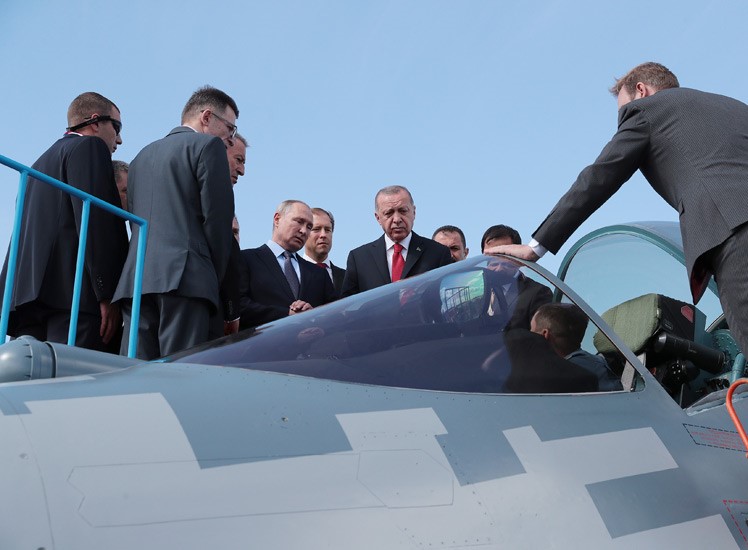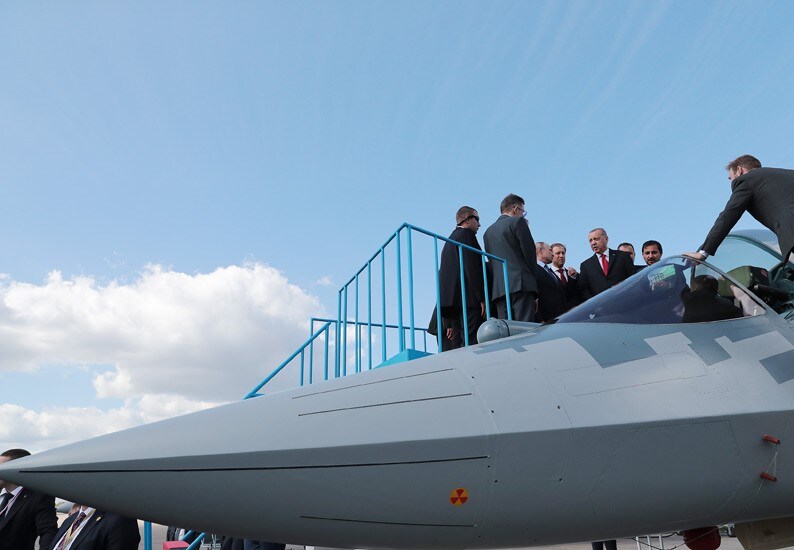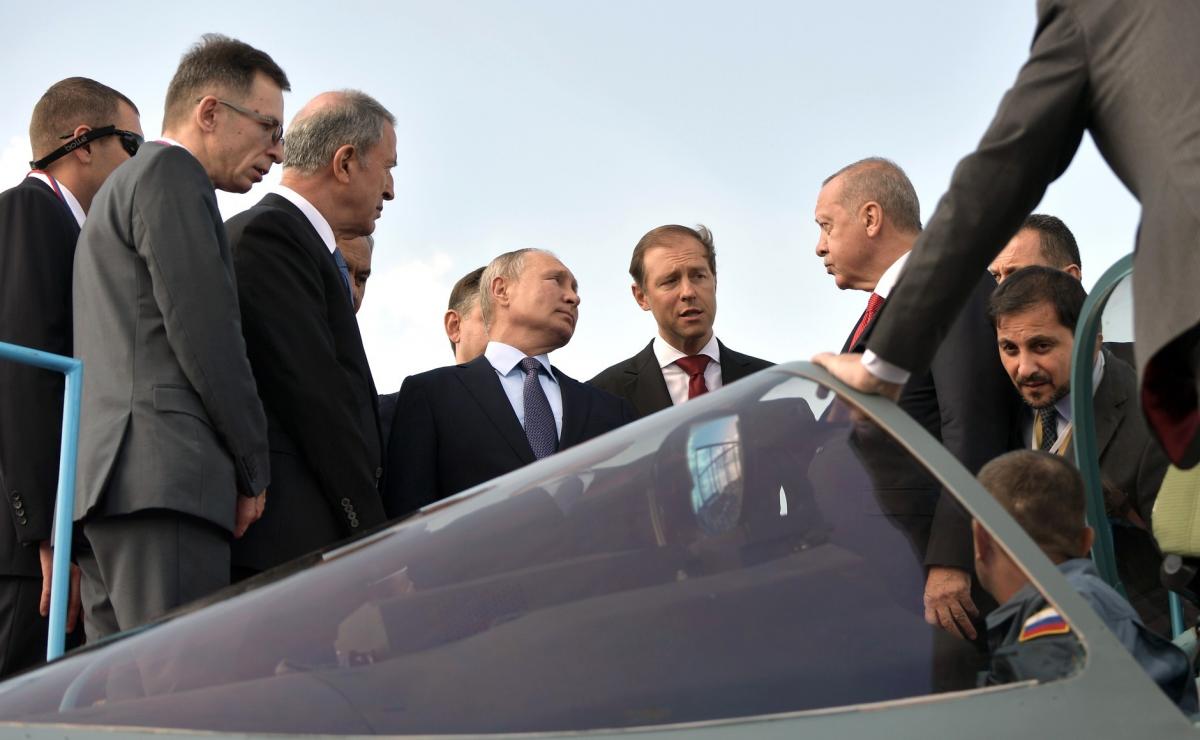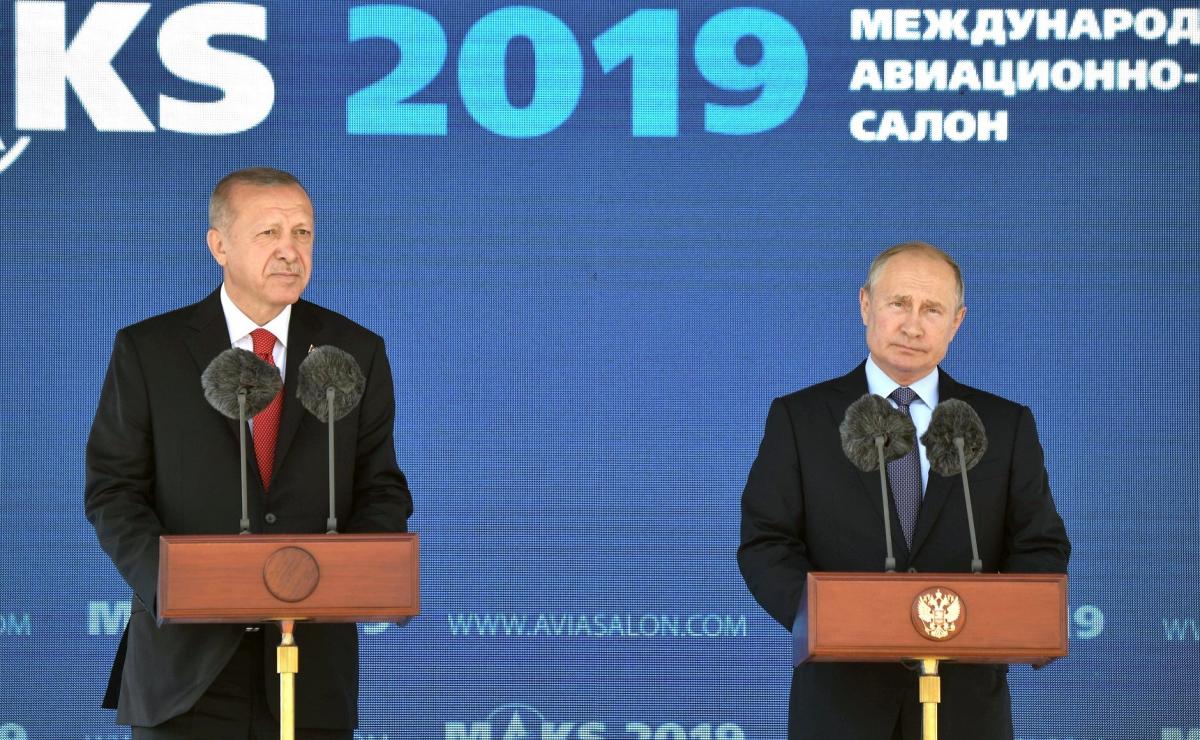On August 27, 2019, Russian President Vladimir Putin met with Turkish President Recep Tayyip Erdoğan in Zhukovsky, southeast of central Moscow, at the 14th International Aviation and Space Salon (MAKS 2019).
Putin's visit to Russia came after Turkish authorities reported that the Syrian Air Force had attacked a convoy of Turkish soldiers that was en route to Border Checkpoint 9 in Idlib province, Syria, on August 19.
An August 19 statement by the Turkish Defense Ministry's August 19 blamed Russia for the attack. The ministry stated: "Despite repeated warnings we made to the authorities of the Russian Federation, the military operations by the regime forces continue in Idlib region in violation of the existing memorandums and agreements with the Russian Federation." Nothing that Russia had been told in advance about the convoy, it added: "We strongly condemn this attack which contradicts the existing agreements, cooperation and dialogue with the Russian Federation. Without prejudice to our rights to self-defense, we expect the necessary measures to be taken to prevent recurrence of such incidents."[1]
In an August 23 phone call, Putin and Erdoğan discussed various aspects of Russian-Turkish cooperation for stabilizing the Idlib de-escalation zone. According to the Kremlin website, the two leaders agreed to step up their joint efforts to eliminate the terrorist threat emanating from that region and to ensure the implementation of the Sochi Memorandum of September 17, 2018. On the same day, it was announced that Erdogan would be paying a one-day visit to Russia on August 27.[2]
Ahead of Erdogan's visit, Russian analyst Boris Dolgov, a senior researcher at the Institute of Oriental Studies of the Russian Academy of Science, said: "The mere fact that the Turkish president is coming to Russia in such haste shows that Turkey does not want a confrontation at the moment."
Indeed, Mehmet Acet, columnist for the AKP mouthpiece Yeni Safak, wrote that the meeting showed that the Russia-Turkey alliance has not been damaged: "Erdogan and Putin made an appearance at the International Aviation and Space Salon MAKS-2019. The most striking detail of the exhibition was the photos of Erdogan examining the Russian fifth-generation Su-57 warplanes [and] the photos of Putin describing the details of the fighter jets and Erdogan listening to him closely. So... Can we consider this picture the start of a new partnership for the Su-57s, just as the one that took place in Sochi for the S-400s? This may very well be possible in a couple of years."[3]
In Hurriyet, Turkish columnist Serkan Demirtas concurred with this view. Commenting on Putin's Moscow visit, he wrote that Erdogan's presence at MAKS 2019 constituted a strong message to Washington, and added: "The message is clear: Turkey is not without alternatives in finding new suppliers if it is excluded from the U.S.-led international projects and denied American weapons. This can also include Russia's fifth-generation SU-57 aircraft instead of Lockheed Martin's F-35s, as Turkey will need to upgrade its aerial defense in the next decade… The fact that Putin promoted the SU-57 to Erdogan at the aviation fair makes the latter's message even stronger. It is, of course, very premature to speculate whether Turkey would choose to buy SU-57s from Russia, but our experience concerning the purchase of the S-400 systems proves that this option may be on the table."
Below is Demirtas' column:[4]

Russian president Putin and his Turkish counterpart Erdoğan inspect the Su-57 cockpit at MAKS 2019. (Source: Tccb.gov.tr)

(Source: Tccb.gov.tr)

(Source: Kremlin.ru)

(Source: Kremlin.ru)
"The Fact That Putin Promoted The SU-57 To Erdogan At The Aviation Fair Makes The Latter's Message To Washington Even Stronger"
"President Recep Tayyip Erdogan and Russian President Vladimir Putin met in Russia yesterday [August 27, 2019] on the sidelines of an important aviation and space fair in which the newest products of the Russian defense industry are being exhibited.
"Although the main reason why Erdogan and Putin met was the recent developments in Syria, particularly in Idlib and in the eastern Euphrates, the venue of their meeting was quite significant and spoke for itself. This marks the joint devotion of two countries seeking more enhanced cooperation in the defense industry.
"The fact that Erdogan has attended the opening ceremony of the defense industry fair along with Putin is symbolic this devotion. It's also symbolically important that Erdogan and Putin's meeting has come on the same day as the beginning of the shipment of the second battery of the S-400 anti-ballistic missile systems from Russia.
"During his speech, Erdogan hailed growing ties between the two nations in a multidimensional form that includes the defense industry as well. 'I believe that the synergy we have with Russia regarding aviation and space sectors will deepen our bilateral relations,' he stated.
"The Turkish president had earlier suggested a partnership with Russia in its northern neighbor's efforts to upgrade the S-400 systems with the S-500 anti-missile weapons.
"All these statements issued by Erdogan could be regarded as a direct message to Washington which has recently halted Turkish participation in the F-35 aircraft project because of Turkey's deployment of S-400s.
"The message is clear: Turkey is not without alternatives in finding new suppliers if excluded from the U.S.-led international projects and denied... American weapons. This can also include Russia's fifth-generation SU-57 aircraft instead of Lockheed Martin's F-35s as Turkey would need to upgrade its aerial defense in the next decade. (Turkey is in efforts to develop its fighter jets, the TF-X, but it would take time before they could be proven to be an efficient vehicle.)
"The fact that Putin has promoted the SU-57 to Erdogan at the aviation fair makes the latter's message even stronger. It's, of course, very premature to speculate whether Turkey would choose to buy SU-57s from Russia, but our experience concerning the purchase of the S-400 systems proves that this option may be on the table.
"Of course, this move would further complicate the Turkish status within NATO and the allied defense architecture as well as its ties with the prominent allies in the Western bloc. But at this point, it seems Erdogan wanted to send a firm message to U.S. President Donald Trump that Washington's policies are pushing Turkey to knock on the doors of other suppliers just like it had to buy S-400s from Russia because its demand for the Patriots was met with no response from the U.S.
"Trump has several times acknowledged this fact and shown an understanding of Turkey's procurement of the S-400s. That was why he exerted efforts to avoid sanctions on Turkey under the CAATSA (Countering America's Adversaries Through Sanctions Act).
"Time will show whether Erdogan's message on SU-57 and F-35s will be received by Washington and to what extent the two allies will be able to resolve this dispute."
[1] Hurriyetdailynews.com, August 26, 2019. See also MEMRI Special Dispatch No. 8241, Leading Turkish Journalist Ergin: Turkish-Russian Relations Face A Stress Test In Idlib, August 26, 2019.
[2] MEMRI Special Dispatch No. 8241, Leading Turkish Journalist Ergin: Turkish-Russian Relations Face A Stress Test In Idlib, August 26, 2019.
[3] Yenisafak.com, August 28, 2019.
[4] Hurriyetdailynews.com, August 28, 2019.





